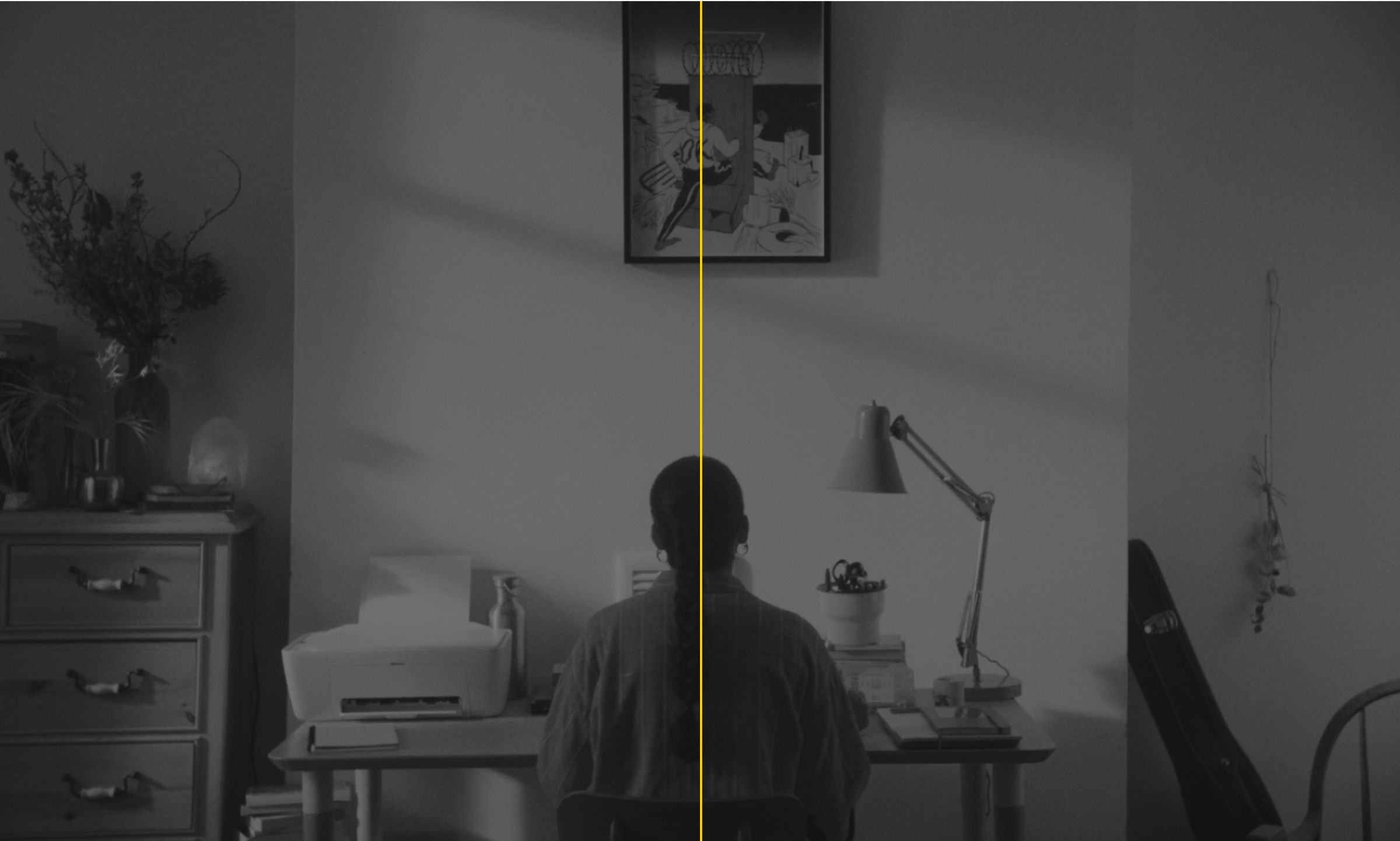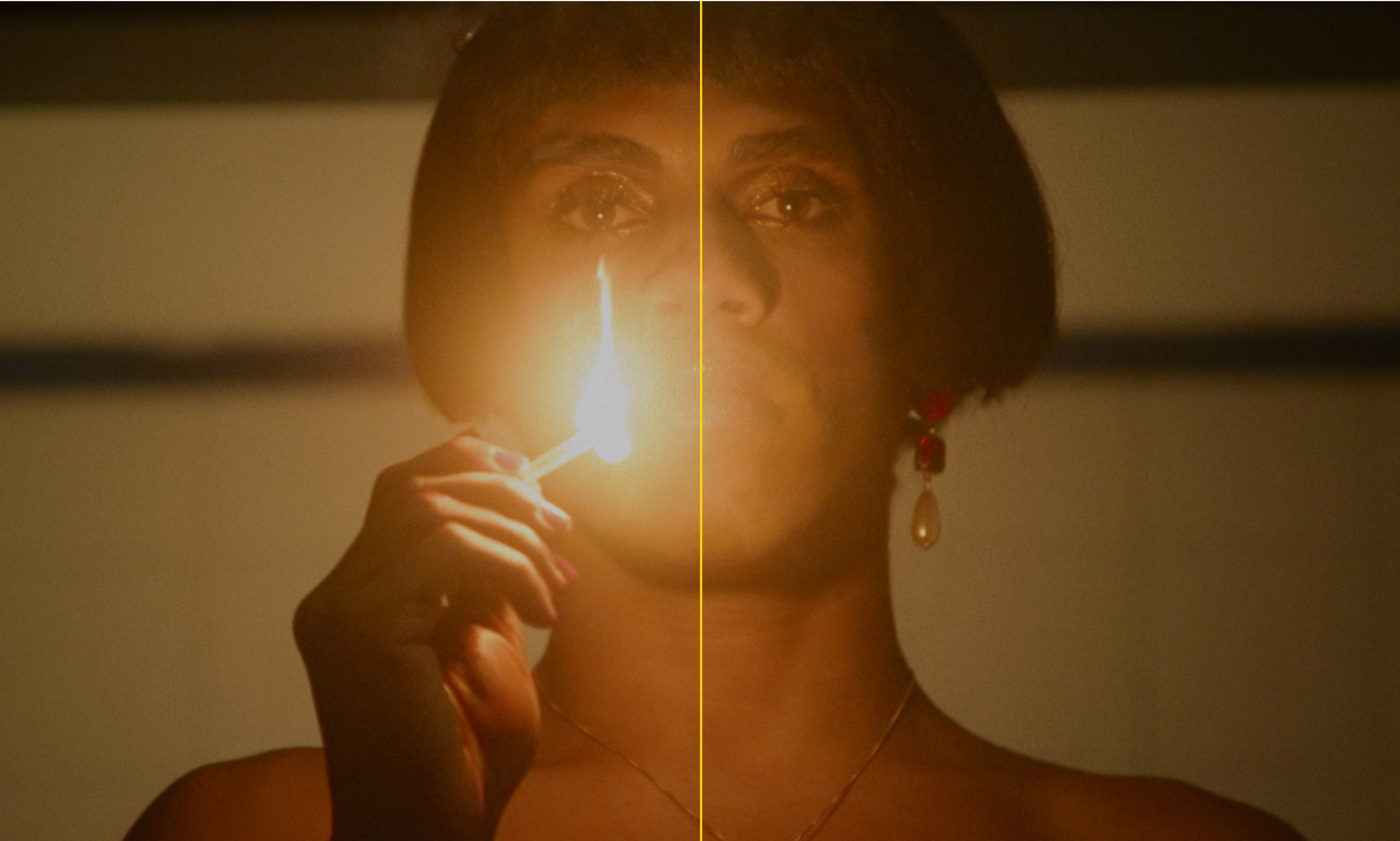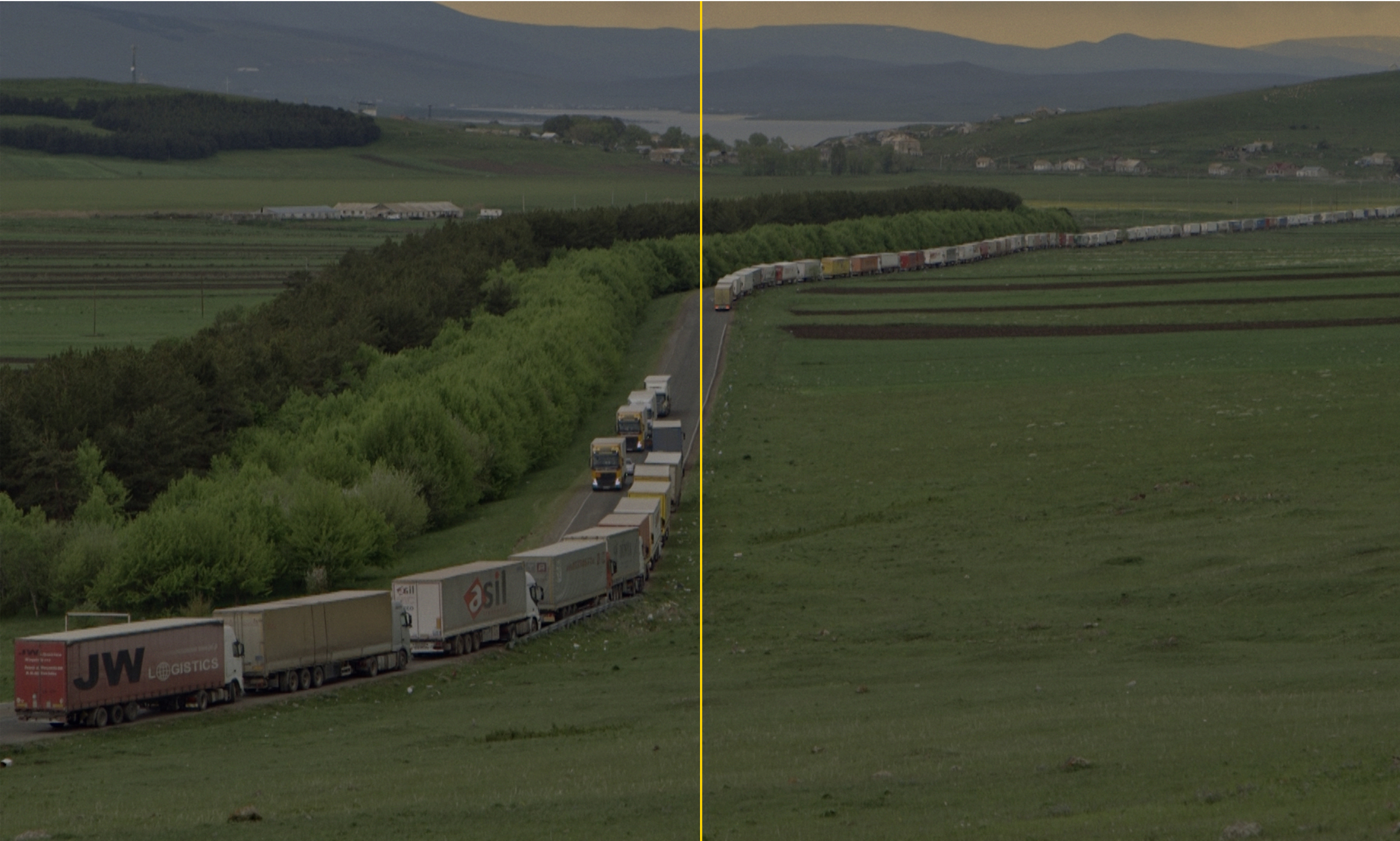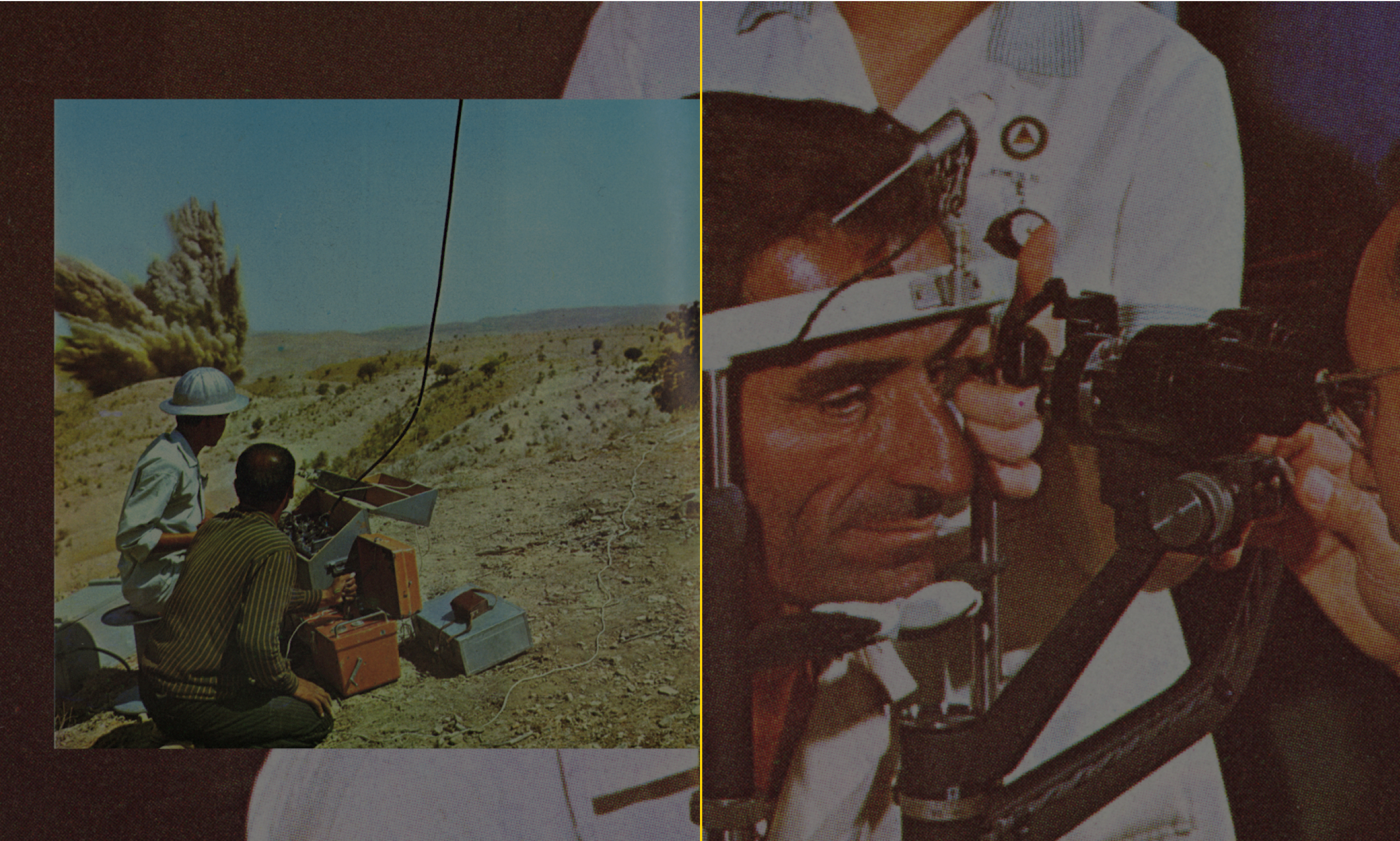SRFF 2024: DOUBLE BILL — PROGRAMME AT A GLANCE
Online overture
October 11–20
︎ Grand Union website, Birmingham
October 11–20
︎ Grand Union website, Birmingham
ONE’S CONNECTION IS ANOTHER’S DIVISION: COLONIAL INFRASTRUCTURES IN SOUTH CAUCASUS AND PALESTINЕ︎
37 minsSEBASTIA DISAGREEMENT (2023) dir. Yiru Qian (15 mins)
A PASSAGE (2019) dir. Felix Kalmenson & Rouzbeh Akhbari (22 mins)
Opening night
Thursday, October 17
︎ 18:00-21:00
︎ Screen 3 at Warwick Arts Centre, Coventry
Thursday, October 17
︎ 18:00-21:00
︎ Screen 3 at Warwick Arts Centre, Coventry
QUEER ARCHIVES AND REENACTMENTS IN LEBANON AND BRAZIL + Q&A︎
NEO NAHDA (2023) dir. May Ziadé (12 mins)
CASA IZABEL (2022) dir. Gil Baroni (85 mins)
︎ Tickets
Friday, October 18
︎ 18:00-20:40
︎ Coventry Transport Museum
︎ 18:00-20:40
︎ Coventry Transport Museum
RAILROADS AND COLONIAL INFRASTRUCTURES IN SOUTH CAUCASUS AND IRAN + Q&A︎
A STATE IN A STATE (2022) dir. Tekla Aslanishvili (46 mins)
SCENES OF EXTRACTION (2023) dir. Sanaz Sohrabi (43 mins)
︎ Tickets (TBA)
Saturday, October 19
︎ 14:00-17:00
︎ Cinema at MAC Birmingham
︎ 14:00-17:00
︎ Cinema at MAC Birmingham
PALESTINIAN-UKRAINIAN SOLIDARITY SCREENING 1: COLLECTING STORIES, PRESERVING CULTURE + Q&A︎
DANCING PALESTINE (2024) dir. Lamees Almakkawy (37 mins)
WEIGHTLESS (2023) dir. Marta Hryniuk & Nick Thomas (70 mins)
+ Q&A (60 mins)
+ after-screening reception (17:00-18:00)
︎ Tickets
Saturday, October 19
︎ 18:00-21:00
︎ Cinema at MAC Birmingham
︎ 18:00-21:00
︎ Cinema at MAC Birmingham
PALESTINIAN-UKRAINIAN SOLIDARITY SCREENING 2: SCRUTINISING THE ENEMY + Q&A︎
PARADISO, XXXI, 108 (2022) dir. Kamal Aljafari (18 mins)
INTERCEPTED (2024) dir. Oksana Karpovych (95 mins)
+ Q&A (60 mins)
+ pre-screening reception (17:00-18:00)
︎ Tickets
Sunday, October 20
︎ 14:00-17:00
︎ Theatre at MAC Birmingham
︎ 14:00-17:00
︎ Theatre at MAC Birmingham
GENOCIDE, DISPLACEMENT, AND FAMILY HISTORIES IN ETHIOPIA AND ARMENIA + Q&A︎
THE MEDALLION (2023) dir. Ruth Hunduma (19 mins)
1489 (2023) dir. Shoghakat Vardanyan (76 mins)
︎ Tickets
Closing night
Sunday, October 20
︎ 18:00-20:30
︎ Theatre at MAC Birmingham
Sunday, October 20
︎ 18:00-20:30
︎ Theatre at MAC Birmingham
KORYO SARAM AND CHINESE LIVERPUDLIANS: STORIES OF EAST ASIAN FORCED DISPLACEMENT IN THE USSR AND THE UK + Q&A︎
THE UNDESIRABLES (2022) dir. Hester Yang (19 mins)
THREE BORDERS (2017) dir. Alisa Berger (55 mins)
︎ Tickets
Online overture
October 11-20
︎ Grand Union website, Birmingham
ONE’S CONNECTION IS ANOTHER’S DIVISION:
COLONIAL INFRASTRUCTURES IN SOUTH CAUCASUS AND PALESTINE
SEBASTIA DISAGREEMENT by Yiru Qian (15 mins)
A PASSAGE by Felix Kalmenson & Rouzbeh Akhbari (17 mins)
Screening Rights Film Festival 2024: DOUBLE BILL, taking place over the weekend of 17-20 October in Birmingham and Coventry, will be preceded by an online overture hosted by the Birmingham-based arts initiative Grand Union. This will be available on the Grand Union website immediately before and during the festival, from 11 to 20 October. The screening of two short films aims to broaden the context of the in-person events, as well as extend their outreach.
Titled ONE’S CONNECTION IS ANOTHER’S DIVISION: COLONIAL INFRASTRUCTURES IN SOUTH CAUCASUS AND PALESTINE and featuring Sebastia Disagreement by Yuri Qian and A Passage by Felix Kalmenson and Rouzbeh Akhbari, the overture deepens the festival’s engagement with the industrial heritage of the Midlands while also resonating formally and thematically with multiple festival titles.
In particular, it serves as a continuation of a screening on railroads and colonial infrastructures in South Caucasus and Iran, hosted at The Transport Museum in Coventry on 18 October. It also connects with two Palestinian-Ukrainian solidarity screenings, taking place at MAC Birmingham on 19 October, and an event focused on genocide, displacement, and family histories in Ethiopia and Armenia, also at MAC Birmingham, on 20 October.
The overture is designed to give guests a glimpse of the broader programme and to convey the concept behind DOUBLE BILL through a concise and evocative experience lasting about half an hour.
Titled ONE’S CONNECTION IS ANOTHER’S DIVISION: COLONIAL INFRASTRUCTURES IN SOUTH CAUCASUS AND PALESTINE and featuring Sebastia Disagreement by Yuri Qian and A Passage by Felix Kalmenson and Rouzbeh Akhbari, the overture deepens the festival’s engagement with the industrial heritage of the Midlands while also resonating formally and thematically with multiple festival titles.
In particular, it serves as a continuation of a screening on railroads and colonial infrastructures in South Caucasus and Iran, hosted at The Transport Museum in Coventry on 18 October. It also connects with two Palestinian-Ukrainian solidarity screenings, taking place at MAC Birmingham on 19 October, and an event focused on genocide, displacement, and family histories in Ethiopia and Armenia, also at MAC Birmingham, on 20 October.
The overture is designed to give guests a glimpse of the broader programme and to convey the concept behind DOUBLE BILL through a concise and evocative experience lasting about half an hour.

SEBASTIA DISAGREEMENT
Yiru Qian / 2023 / UK / 15’ / Arabic, English with written English
Through highly inventive methods of physical and immaterial visualisation — digital 3D models and screen capture, as well as miniaturised re-enactments using hands, maps, gypsum models, and even puppetry, with marionette oranges serving as stand-ins for the legendary Jaffa fruit — filmmaker-researcher Yiru Quan unpacks the zionist occupation of Masudiya and Sebastia stations, once crucial sites for Palestinian agricultural activities and historically important transit points on the Hejaz railway, which connected cities across North Africa and the Middle East.

A PASSAGE
Felix Kalmenson & Rouzbeh Akhbari / 2019 / Armenia / 17’ / Armenian, Russian, Mandarin Chinese with English subtitles
Oil trucks with Farsi on them, a children’s choir singing in Armenian, an Armenian man singing about the now-discontinued Yerevan-Baku railway in Russian, and the haunting, enigmatic images of two horsemen with mirrors for faces, who search for wind as if to help a nowhere-to-be-seen plane take off and carry a ghostly image of a train through a derelict Soviet-era tunnel — the Meghri region in southern Armenia, which borders Azerbaijan, emerges as a territory in-between languages, cultures, temporalities, and, as discussed by radio hosts in Mandarin Chinese and Russian in the background, neoimperialist geopolitical interests in the South Caucasus and the Middle East.
FILMMAKERS’ BIOS
Yiru Qian is an architect and visual artist who currently lives and works in London. Influenced by her interests in architectural design, archival research, and the archaeology of knowledge, she explores historical narratives that traverse time and space through imagery, mapping, and making.
Pejvak is the long-term collaboration between Felix Kalmenson and Rouzbeh Akhbari. Through their multivalent, intuitive approach to research and living they find themselves in a convergence and entanglement with like-minded collaborators, histories and various geographies.
Opening night
Thursday, October 17
︎ 18:00-21:00
︎ Screen 3 at Warwick Arts Centre, Coventry
QUEER ARCHIVES AND REENACTMENTS
NEO NAHDA by May Ziadé (12 mins)
CASA IZABEL by Gil Baroni (85 mins)
+Q&A (60 mins)
Thursday, October 17
︎ 18:00-21:00
︎ Screen 3 at Warwick Arts Centre, Coventry
QUEER ARCHIVES AND REENACTMENTS
IN LEBANON AND BRAZIL
NEO NAHDA by May Ziadé (12 mins)
CASA IZABEL by Gil Baroni (85 mins)
+Q&A (60 mins)
On the opening night of its 10th anniversary, Screening Rights is staging a special event at Warwick Arts Centre centred around queer archives and reenactments from Lebanon and Brazil and featuring May Ziadé’s short Neo Nahda alongside Gil Baroni’s feature Casa Izabel. Equal parts vivid reconstruction and ingenious fictionalisation of the narratives that have been suppressed or underrepresented due to the turbulent histories of the Middle East and Latin America, Ziadé’s and Baroni’s films, each in their unique way, outline queer genealogies and combat epistemic oblivion.

NEO NAHDA
May Ziadé / 2022 / UK / 12’ / English
In French-Lebanese filmmaker May Ziadé’s Neo Nahda, Mona, a young woman in modern-day London, goes down a rabbit hole of amateur research after coming across photographs of Arab women cross-dressing in 1920s Lebanon. Rich with photographic influences — Maryam Şahinyan, Van Leo, and Marie al-Khazen come to mind — Neo Nahda fuses together images discovered by Ziadé in the Arab Image Foundation in Beirut with inventions of her own. The result is an electrifying queer renaissance of sorts, hinted at in the film’s title (Nahda being the Islamic modernist movement — ‘the Awakening’ — of the early 20th century).

CASA IZABEL
Gil Baroni / 2023 / Brazil / 85’ / Portuguese with English subtitles
Created in a similarly playful dialogue with the queer narratives of the past, Gil Baroni’s Casa Izabel was loosely inspired by the real-life story of Casa Susanna, a bungalow hidden in the woods of upstate New York where a group of transgender women and cross-dressing men would clandestinely convene and find refuge in the mid-20th century. While its function largely remains the same, in Baroni’s colourful, Almodóvarian comedic thriller, Casa is transported to the depths of the Brazilian forest of the 1960s. The story of the original Casa is given a deliciously dark twist, complicated by jealousy, racial and class tensions, and lurking political intrigue à la Kiss of the Spider Woman. It is a work of speculative fiction that is as indebted to Casa Susanna as it is to the tradition of Brazilian anti-fascist resistance.
The screening will be accompanied by a video introduction from Casa Izabel’s director, Gil Baroni, and followed by a discussion featuring invited guests. The panellists will include May Ziadé (the filmmaker behind Neo Nahda), guest curator Daniel Zacariotti (Film & TV PhD candidate at Warwick), the Queer Research Network (Airelle Amedro, Aman Sinha, and Polina Zelmanova, all PhD candidates at Warwick), and Misha Zakharov (curator at Screening Rights and Film & TV PhD candidate at Warwick).
May Ziadé is a French and Lebanese filmmaker and filmworker based in London, whose work “explores the physical and emotional consequences of the cultural and social pressures to conform.”
Gil Baroni is a writer, director, and producer born in Brazil. His filmography approaches themes surrounding human rights issues, especially minority empowerment, gender equity, the LGBTQI+ universe, and social class struggle.
Read film scholar Daniel Zacariotti’s interview with Gil Baroni:
Read film scholar Daniel Zacariotti’s interview with Gil Baroni:
Friday, October 18
︎ 18:00-20:40
︎ Coventry Transport Museum
A STATE IN A STATE by Tekla Aslanishvili (46 mins)
SCENES OF EXTRACTION by Sanaz Sohrabi (43 mins)
+ Q&A (60 mins)
︎ 18:00-20:40
︎ Coventry Transport Museum
RAILROADS AND COLONIAL INFRASTRUCTURES IN SOUTH CAUCASUS AND IRAN
A STATE IN A STATE by Tekla Aslanishvili (46 mins)
SCENES OF EXTRACTION by Sanaz Sohrabi (43 mins)
+ Q&A (60 mins)
Screening Rights Film Festival is bringing the latest socially engaged and formally innovative cinema from the Global South to audiences in the West Midlands. This year, we’re partnering with the Transport Museum in Coventry to stage a site-specific event that engages with the industrial heritage of the Midlands, as well as the British Petroleum archives at the University of Warwick. Titled RAILROADS AND COLONIAL INFRASTRUCTURES IN SOUTH CAUCASUS AND IRAN, it features Tekla Aslanishvili’s A State in a State alongside Sanaz Sohrabi’s Scenes of Extraction—two film essays that evoke detective investigations in the thoroughness of their research. In line with the 2024 festival’s theme, DOUBLE BILL, the screening tackles various geographical contexts that, on closer inspection, can be tenuously linked—in this case, British petrocolonialism in Iran and Soviet railroads in the South Caucasus.

A STATE IN A STATE
Tekla Aslanishvili / 2022 / Georgia / 47’ / Georgian, Russian, and English with English subtitles
In her symphonic, richly multilingual documentary, Georgian filmmaker Tekla Aslanishvili collects oral testimonies from railway workers, journalists, and researchers who worked on or around the railways that connect(ed) Georgia, Armenia, and Azerbaijan with russia, Turkey, and Iran. Over time, these railway workers developed chains of solidarity that transcended the politics of the nation-states to which they belonged. Although many of the railways are classified and therefore prohibited from filming, they emerge as somewhat of a protagonist in the film—the titular semi-autonomous ‘state within a state,’ historically an instrument of colonisation, now being used to turn the tables on the oppressors.

SCENES OF EXTRACTION
Sanaz Sohrabi / 2023 / Canada/Iran / 43’ / English and Farsi with English subtitles
In the second part of her ongoing trilogy on British petrocolonialism in Iran—following the acclaimed One Image, Two Acts (2020)—Iranian filmmaker Sanaz Sohrabi delves deeper into the declassified photographic archives of British Petroleum to uncover haunting stories of labour exploitation, ecological devastation, and extractivism, focussing specifically on the role railroads played within the larger colonial infrastructures. The screening of this work is intended to engage with the industrial heritage of the Midlands, as well as the British Petroleum archives housed at the University of Warwick.
The screening will be accompanied by a panel discussion, featuring guest curators, invited panellists, and filmmakers.
A larger context for this screening is provided through an online programme, hosted by Screening Rights in collaboration with the Birmingham-based arts initiative Grand Union, titled ONE’S CONNECTION IS ANOTHER’S DIVISION: COLONIAL INFRASTRUCTURES IN SOUTH CAUCASUS AND PALESTINE, featuring Sebastia Disagreement by Yiru Qian and A Passage by Felix Kalmenson and Rouzbeh Akhbari.
A larger context for this screening is provided through an online programme, hosted by Screening Rights in collaboration with the Birmingham-based arts initiative Grand Union, titled ONE’S CONNECTION IS ANOTHER’S DIVISION: COLONIAL INFRASTRUCTURES IN SOUTH CAUCASUS AND PALESTINE, featuring Sebastia Disagreement by Yiru Qian and A Passage by Felix Kalmenson and Rouzbeh Akhbari.
FILMMAKERS’ BIOS
Tekla Aslanishvili is an artist, filmmaker and essayist whose works emerge at the intersection of infrastructural design, history and geopolitics.
Sanaz Sohrabi is an artist, filmmaker and essayist whose work investigates the impermanence and malleability of historical records and narratives.
Saturday, October 19
︎ 14:00-17:00
︎ Cinema at MAC Birmingham
PALESTINIAN-UKRAINIAN SOLIDARITY SCREENING 1: COLLECTING STORIES, PRESERVING CULTURE
DANCING PALESTINE by Lamees Almakkawy (37 mins)
WEIGHTLESS by Marta Hryniuk & Nick Thomas (70 mins)
+ Q&A (60 mins)
+ after-screening reception (17:00-18:00)
︎ 14:00-17:00
︎ Cinema at MAC Birmingham
PALESTINIAN-UKRAINIAN SOLIDARITY SCREENING 1: COLLECTING STORIES, PRESERVING CULTURE
DANCING PALESTINE by Lamees Almakkawy (37 mins)
WEIGHTLESS by Marta Hryniuk & Nick Thomas (70 mins)
+ Q&A (60 mins)
+ after-screening reception (17:00-18:00)
Screening Rights Film Festival is bringing the latest socially engaged and formally innovative cinema from the Global South to audiences in the West Midlands. The centrepiece of its 10th-anniversary edition, subtitled Double Bill, consists of two Palestinian-Ukrainian solidarity screenings designed to complement one another. The first of these, featuring Lamees Almakkawy’s Dancing Palestine and Marta Hryniuk’s and Nick Thomas’s Weightless, is dedicated to resisting the perpetual, ages-long genocides through cultural preservation.

DANCING PALESTINE
Lamees Almakkawy / 2024 / UK / 37’ / Arabic, English with English subtitles
‘When home is gone, the body becomes home.’ At the heart of Lamees Almakkawy’s mid-length film essay Dancing Palestine is dabke, historically a workers' dance that has, over time, evolved into a form of remembrance and resistance. Through an ingenious and deeply moving interplay between the material and immaterial, the past and the present, the film combines digital screen-life elements, analogue archives, and dabke performances set against photos of Palestinian landscapes projected onto the dancers’ bodies. Drawing on the same theme of Palestinian cultural preservation that was prominent in last year’s Screening Rights title, Jumana Manna’s Foragers, Almakkawy’s film posits dabke as a defiant, life-affirming celebration of Palestinian culture in the face of its perpetual extermination. Completed as part of her Creative Documentary by Practice MFA at the Anthropology Department of University College London, and realised in close collaboration with Palestinian dabke dancers, Almakkawy’s film premiered at the latest Sheffield Doc, the premier documentary film festival in the UK, where it received a Special Mention prize.

WEIGHLTESS
Marta Hryniuk & Nick Thomas / 2023 / Netherlands, Ukraine / 70’ / English, Ukrainian with English subtitles
Khrystyna Bunii is an anthropologist who collects the culture of the Hutsuls, a unique ethnographic group of people living in the west of Ukraine. Marta Hryniuk’s and Nick Thomas’s Weightless follows Bunii as she digitises family photos, collects clothes and food recipes, and records tsymbaly music and oral histories of displacement and genocide. What emerges is a fragile yet ever-persistent culture situated at a politically tumultuous crossroads of cultures, languages, and ideologies, one that has been — and continues to be — resisting erasure. While Alisa Kovalenko’s We Will Not Fade Away, screened as part of last year’s Screening Rights, was filmed in the bleak east of Ukraine, where russia’s war has been raging for a decade, Weightless takes place in the breathtaking Carpathian Mountains before the start of the russian full-scale invasion, presenting a different perspective by highlighting the unruly beauty of the natural landscape and Hutsul culture.
The screening will be accompanied by a panel discussion, featuring guest curators, as well as filmmakers Lamees Almakkawy, Marta Hryniuk and Nick Thomas. The screening will be followed by a reception, featuring traditional food from the local businesses.
FILMMAKERS’ BIOS
Lamees Almakkawy obtained her Bachelor of Arts in Film and New Media from New York University Abu Dhabi, and a Master of Fine Arts in Creative Documentary by Practice from University College London. Her interests lie in the intersection of documentary and fiction filmmaking, focusing on identity, performance, and memory.
Marta Hryniuk and Nick Thomas are visual artists, filmmakers, and cultural organisers based in Rotterdam, where they established the film collective WET film.